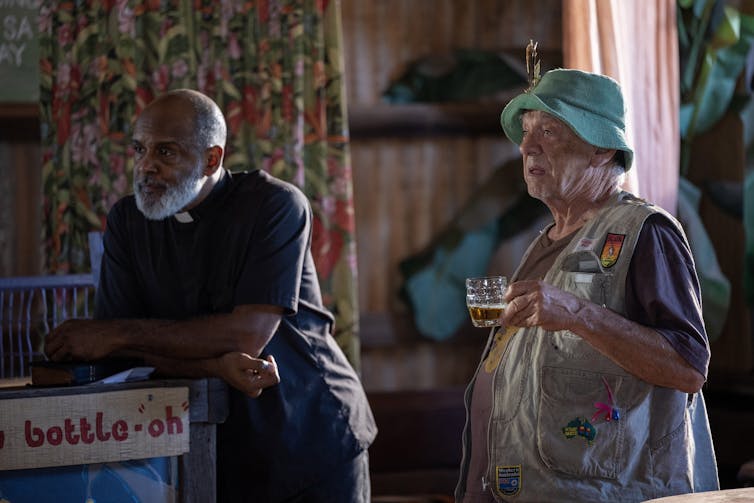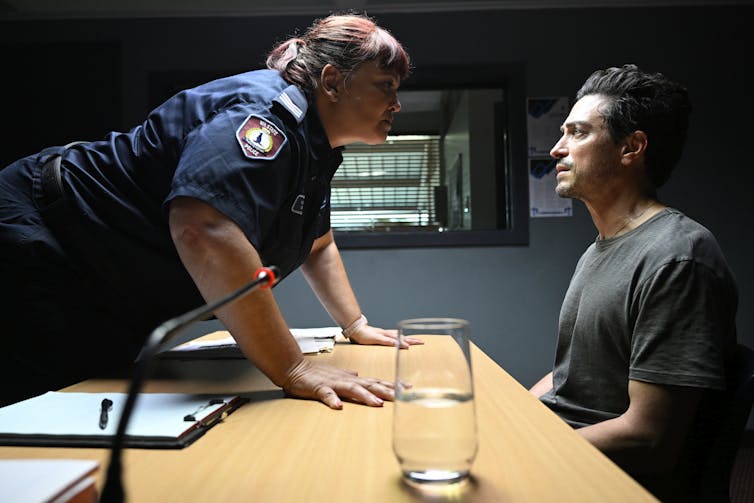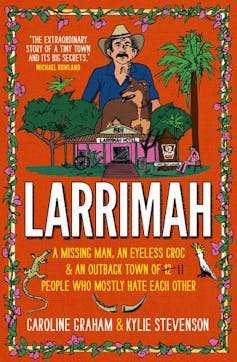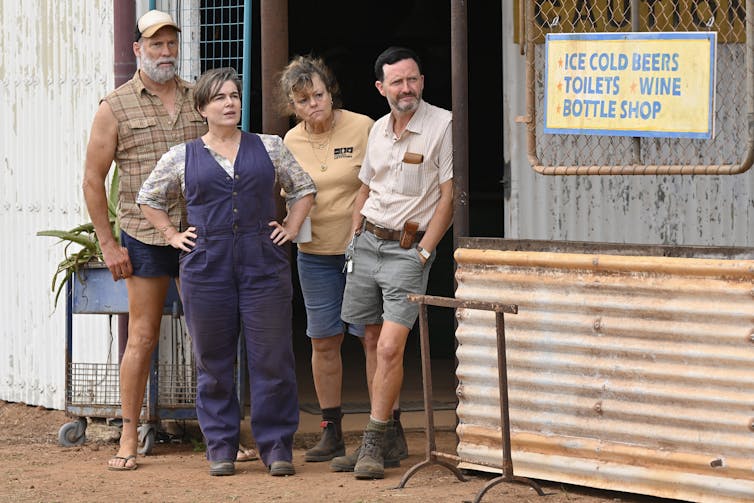Ben Feldman leads Stan Original’s new 12-episode series Population: 11 as Andy, a hapless American banker who travels to a tiny, outback town of 12 in search of his estranged father Hugo, played by Darren Gilshenan.
Inevitably, things do not go to plan.
Upon his arrival at Bidgeegud – a town of “Outback UFO” tours with “guaranteed sightings”, a zoo comprised of a single crocodile, and a pub where the priest holds confessional – Andy soon discovers Hugo has gone missing. His subsequent search for clues is helped by fellow outsider Cassie (Perry Mooney).
The pair progressively uncover the innumerable secrets of the town, one suspicious resident at a time.
Stan
A fair go (at humour), mate
Population: 11 is a comedic crime-thriller created by Phil Lloyd, perhaps best known for his writing on 2014 miniseries The Moodys and 2016-17 series Here Come the Habibs!
It draws on the same heavy-handed comedy featured in Lloyd’s previous exploits. As an example, the Chinese restaurant in Bidgeegud sells “camel-toe pies”.
But most heavy-handed is the show’s revelling in Aussie stereotypes. Self-centred Andy is frustrated that “everything bites” after kicking a termite’s nest. He criticises the only person trying to help him in a mock Australian accent, and lashes out at the “dingo dollars or whatever you people call your money”.
Equally, the locals tell Andy “Americans always want something” and later on say “bloody yanks think you can buy everyone off”.
Australia through the eyes of international leads
Australian-based streamer Stan is arguably best known for its Australian content and local audience.
But Population: 11 appears to be part of an emerging trend of offering Australian content from an international lead’s perspective: think The Tourist (led by Jamie Dornan), Gold (led by Zac Efron) or Wolf Like Me (led by Josh Gad).
The push for international talent has long been an important strategy to draw wider audiences to local content, but it sits uncomfortably when this content is so heavily based – at least in places – on Australian stereotypes.
That said, after what is perhaps an inauspicious start, Population: 11’s finale offers a genuinely satisfying conclusion. It ties up a scatter-gun of loose ends, allows the charismatic Feldman to relax into a more fully realised version of Andy, and emphasises what wasn’t always obvious: this is a story about belonging.

Stan
Throughout its 12 half-hour episodes, one of the show’s strengths is its talented crew. Directors Helena Brooks and Trent O’Donnell work alongside a veteran supporting cast.
This cast includes the always-entertaining Katrina Milosevic as highly sexed local cop Geraldine, Stephen Curry as general store owner Noel, Tony Briggs as Jimmy the priest and Chai Hansen as station hand Gareth.

Stan
Lost in … Larrimah?
If the premise of Population: 11 sounds somewhat familiar, it’s because it was reportedly “inspired” by the 2017 disappearance of Patrick “Paddy” Moriarty and his dog Kellie from the remote, 11-person town of Larrimah in the Northern Territory.
While neither Moriarty nor Kellie has been found, the coroner concluded “Paddy was killed in the context of and likely due to the ongoing feud he had with his nearest neighbours”.
Moriarty’s disappearance has been touted as Australia’s own “Tiger King” tale, after being made the subject of Kylie Stevenson and Caroline Graham’s Walkey Award-winning podcast Lost in Larrimah (2018), a subsequent book titled Larrimah (2021) and HBO documentary Last Stop Larrimah (2023).

Allen and Unwin
While there are clear links with Population: 11’s central mystery, quirky interpersonal drama and outback town of misfits, the show is otherwise only loosely related to the Larrimah mystery. Population: 11’s opening scene, for instance, shows Hugo seemingly being abducted by aliens.
Screening the Kimberly
Where Larrimah is more than 400 kilometres south-east of the Northern Territory capital Darwin, Population: 11 was filmed in Derby and the wider Kimberley region of Western Australia. Strikingly beautiful landscapes feature throughout the series.
Stan partnered with Hollywood studio Lionsgate and Jungle Entertainment to film in the region, making it one of the first Stan Original series to be filmed in the state. The other is the upcoming series Invisible Boys.
The combined effect of its cinematography, real-life inspiration and genuinely likeable cast make Population: 11 – even when it stumbles – an engaging view. I hope it encourages Stan to bring more work to the region, and to other Australian regions it has yet to visit. Because local content is always worth encouraging.
Population: 11 premieres on Stan on March 14.

Stan




